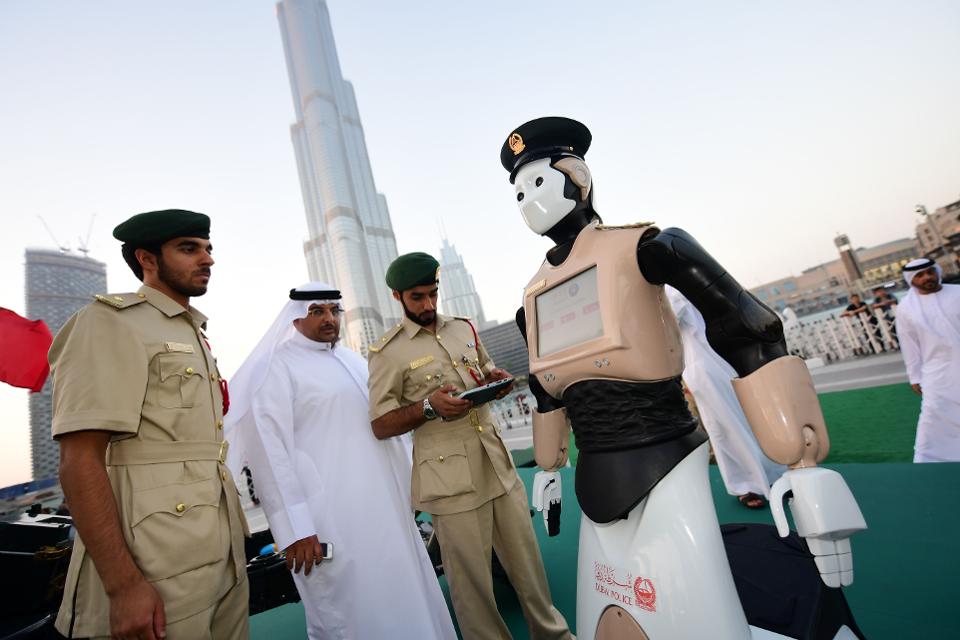Digital Lives, Digital Art?
“We often only understand things when we see them through the lens of fiction or art and culture,” stated the British writer, editor and curator Shumon Basar at this year’s Global Art Forum. Can creativity help us to understand an unpredictable future better?
Ramin and Rokni Haerizadeh speaking at the Global Art Forum 2018 in a session titled I Am A Human Artist. Image taken by Anna Seaman
During the Global Art Forum 2018, which took place alongside the international art fair Art Dubai, in a session titled I Am a Human Artist, Ania Soliman, an interdisciplinary artist, gave a brief but captivating presentation on artificial intelligence (AI), nascent consciousness and the constitutional differences between humans and machines. In it, she referred to a conversation that occurred in the summer of 2017 between two Facebook trading bots called Alice and Bob.
The robots were undergoing training to be able to negotiate with human beings, but the experiment was shut down after Alice and Bob modified English to make it easier for them to communicate and created sentences that were gibberish to watching scientists. Effectively, they began talking in a language that only they understood.
Excerpt of the conversation between two chat-bots called Alice and Bob as part of an aborted Facebook AI experiment. Courtesy of Facebook Artificial Intelligence Research
Discussing paranoia and the potentials of automation
The Global Art Forum was organised under the presumption that automation, more than any other factor, will fundamentally alter our working lives. Driverless cars are already delivering pizzas in the US, mechanised teachers are giving maths lessons in Finland and Bill Gates has suggested that at some point in the not too distant future robots will pay taxes. The presentation titled ‘I Am Not A Robot’ was just one part of the wider event, which focused on the power, paranoia and potentials of automation.
It was programmed by Shumon Basar, a British writer, editor and curator, in collaboration with Marlies Wirth, the curator of digital culture at the Museum of Applied Arts in Vienna and Noah Raford, the chief operating officer of the Dubai Future Foundation, who also goes by the somewhat avant-garde title ‘Futurist-in-Chief’.
The speakers were chosen for their interest in AI and cutting-edge technologies at the intersection of art as well as for their ongoing investigation of notions such as digital disruption. Digital disruption takes place when the digital machines or robots that we create to make our lives easier, interrupt existing systems in a new or surprising way and, as such, go beyond the potential for which they were originally intended. “It is usually the unintended consequences of technology that dictate the future,” the artist Soliman explains.
Marlies Wirth, Noah Raford and Shumon Basar giving opening remarks at Art Dubai’s Global Art Forum 2018. Image courtesy of Art Dubai
Dubai - ten years ahead of the rest of the world?
The fact that Dubai was a host to such an event in the first place is pertinent. Dubai is one of the few cities taking active steps to predict and engage with digital disruption, rather than simply manage it when it happens.
Basar explains this further: “Digital disruption is an intended interruption of an existing system, which reorganises it and takes it to the next level. What Dubai is doing on a federal level is trying to anticipate disruption by putting in place government accelerators. They are saying ‘let’s not be on the receiving end of changes but lead on them’.”
In Dubai, the police force is currently testing its very own robotic crime busters – or robocops, so to speak – and predict that by 2030, at least 25 per cent of its force will be robots. This is fitting for a city that is already openly and ambitiously forward-thinking: Dubai pursues the ‘10x Initiative’, which aims to position the city ten years ahead of the rest of the world by the end of the coming decade.
At the 2018 World Government Summit, Dubai’s Future Foundation hosted an exhibition of what they imagined life to look like in 2035 featuring smart technologies that will predict what you want to eat or help control your moods. Whilst this shows Dubai to be at the forefront of creativity and design fiction, it also highlights that the only way to avoid digital disruption is to foresee it.
The first robotic policeman is currently undergoing testing in Dubai’s Police Force. Image courtesy of Dubai Police Smart Services Department.
Artistic creativity holds the key
But how do we do this? Perhaps the answer lies in the arts. We know already that robots have the ability to exceed what they have been programmed to do and therefore, we are living in an age of artificial intelligence. It is vital therefore, to put this in an artistic context to help us understand what is happening.
“Creative thinkers are often in the best position to think about this critically,” says Basar. “The role of science fiction is important here, not just as entertainment but for cultural diagnosis. We often only understand things when we see them through the lens of fiction or art and culture.”
Art and digitisation - “an exciting progression”
So, while headlines try to intimidate us with threats of robotic takeovers and smart systems outwitting their creators, from an artistic point of view it creates a plethora of new ways in which to interpret the social sphere of human existence. Perhaps creativity can allow us to best understand the unpredictable future; something that has been art’s role since the beginning of civilisation.
This piece was part of an ongoing series for Swiss bank Julius Baer about Dubai's artistic infrastructure. For more details visit www.juliusbaer.com




